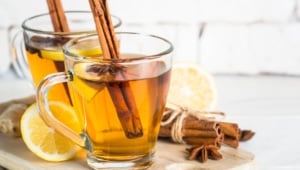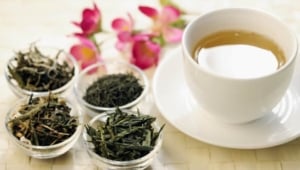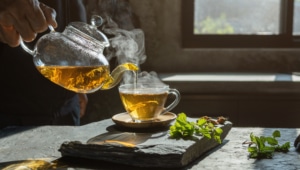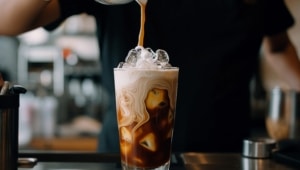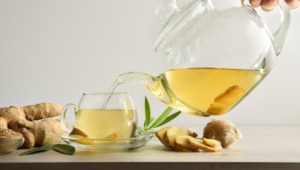9 Health Benefits of Chai Tea & 5 Tips
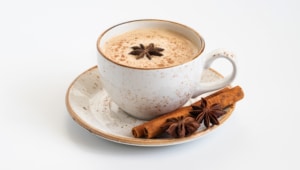
Chai tea may seem like a modern invention, brought to us by the likes of Starbucks, but did you know it’s thousands of years old? Learn here everything you need to know about the health benefits of chai tea as well as potential risks and easy hacks.
The beginnings of chai date back to Assam in India, where a king is said to have created this delicious tea blend more than 5000 years ago. Yet there’s so much more to chai than just the fragrant blend of spices and delicious flavors.
Chai tea is full of health benefits, too. This popular tea blend is made up of a selection of powerful spices, which can improve your health in a variety of ways.
In this article, we’ll delve into the different ways chai tea can help your body and mind. We’ll also go over the spices traditional chai contains, how you can modify it to suit your tastes and needs, and what you need to make a delicious chai tea at home.
Interesting Facts about Chai Tea

Interesting Facts about Chai Tea
At over 5000 years old, chai tea is one of the most popular tea blends of all time. It’s unsurprising then that there are some very interesting facts about chai. A couple of our favorites include:
- Chai can be made with many different spice blends. Creating your own based on your mental and physical needs can be incredibly rewarding.
- Chai is the Indian word for tea, and the Hebrew word for life. Nobody knows for sure whether there’s a connection between the two. However, given that chai tea has so many health benefits, it could well be the case that ‘tea’ gives you ‘life.’
- American chai tea is actually what’s known as a ‘chai latte’, and is significantly sweeter than the Indian tea.
- There are many varieties of chai tea available, with blends including black tea, green tea, white tea, matcha, rooibos, and yerba mate.
- Chai tea is better for the environment than coffee. Why? Simply because you need a lot less water to grow tea.
Origin and Where Chai Tea Comes From

Origin and Where Chai Tea Comes From
As we’ve mentioned above, chai tea dates to more than 5000 years ago, when an Indian king first created it in the region of Assam, India.
Chai may also be called ‘masala chai’, which translates to ‘spiced tea.’ Masala refers to a mix of spices which are added to the tea.
What Chai Tea Is Made Of and Traditional Ingredients
Traditional masala chai is made with black tea leaves, hot water, hot milk, and a mix of cloves, cinnamon, nutmeg, cardamom, ginger, and black peppercorns. Some blends may also include star anise, fennel, or saffron.
What Chai Tea Tastes Like

What Chai Tea Tastes Like
Chai tea has spiced flavors that have a lovely warming effect on your body. It’s slightly sweet on its own, and even more so when sugar or honey is added to it.
Indian chai tea is generally drunk during monsoon season to comfort and warm the body. In Northern India, chai is enjoyed all year, and during pretty much any time of day.
In the West, chai tea is generally more synonymous with the colder months as well. It makes a great, warming Fall-time beverage that offers tons of health benefits, too.
Does Chai Tea Have Caffeine?

Does Chai Tea Have Caffeine?
The short answer is maybe. It depends on your chai tea blend. If your tea contains black or green tea, it will contain caffeine. If it’s made with rooibos, it will not contain caffeine, making it ideal with those who prefer a decaf tea or who avoid caffeine for medical reasons.
Nutritional Facts and Calories of Chai Tea

Nutritional Facts and Calories of Chai Tea
One cup of unsweetened chai tea without any added dairy or plant milk contains no calories, protein, fat, carbohydrates, fiber, or sugar.
It does contain vitamins and minerals, including vitamin C, B vitamins, calcium, folate, magnesium, and potassium. The exact makeup of nutrients depends on what spices are used to make your tea.
Depending on whether your blend is made with green, black, or another kind of tea, it’ll also contain different levels of polyphenols and catechins. These offer additional health benefits.
Health Benefits of Drinking Chai Tea

Health Benefits of Drinking Chai Tea
Because of the many spices chai tea contains it is full of helpful benefits for your mind and body.
You can even modify your chai masala blend and aim the spice contents towards very specific benefits.
Here is a list of the most notable benefits you can gain from adding chai tea to your diet.
Ginger Reduces Nausea and Promotes Digestion
Ginger has been used since ancient times to promote digestion and help with nausea and vomiting. It encourages your digestive system to work more efficiently, which also helps with gas.
Ginger may also be an effective natural remedy for pregnancy-related nausea, though experts recommend only taking very small doses as larger doses could contribute to miscarriage risks.
Tannins and Polyphenols in Tea Promote Relaxation

Tannins and Polyphenols in Tea Promote Relaxation
Tea tannins may have anti-inflammatory effects, similar to polyphenols, which also help against inflammation. Whether it’s because of this effect or via other properties present in these two substances, they promote relaxation and may reduce anxiety and stress.
Cinnamon is Anti-Inflammatory, Anti-Viral, Anti-Bacterial, and Antifungal

Cinnamon is Anti-Inflammatory, Anti-Viral, Anti-Bacterial, and Antifungal
Cinnamon contains phytochemicals which have effective anti-viral, anti-inflammatory, anti-fungal, and anti-bacterial properties.
This makes cinnamon a powerhouse for fighting off colds and illnesses.
Certain compounds in cinnamon are also efficient at targeting free radicals in the body, which may even be helpful in the fight against certain cancers.
Cardamom is a Natural Antidepressant and May Help With Anxiety

Cardamom is a Natural Antidepressant and May Help With Anxiety
Cardamom can be used to reduce symptoms of stress and relieve anxiety. The reason for this is behind the antioxidant thiamine, which is present in cardamom.
Thiamine is great for reducing oxidative stress in your brain, thereby making it an efficient natural antidepressant. Cardamom is great for use in aromatherapy, too.
Cloves May Balance Your Hormones

Cloves May Balance Your Hormones
Cloves contain high amounts of the mineral manganese, which helps your body make hormones and manages enzymes which help repair bones. Clove extract may boost prolactin and testosterone levels. In other words, cloves may also improve sexual performance.
Black Pepper Rids Your Body of Toxins
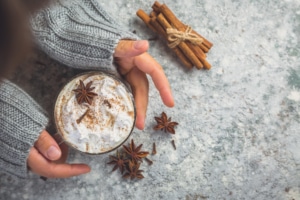
Black Pepper Rids Your Body of Toxins
Black pepper is a wonderful spice, which not only adds a lovely warmth to your chai tea, but also increases the production of free radicals in your body.
This may trigger an irritation of your intestines, causing a kind of detoxification. It’s easy to see here that too much pepper could also cause too much irritation, however, in some cases even resulting in mild intestinal bleeding.
Nutmeg May Provide Natural Pain Relief and Boost Skin Health
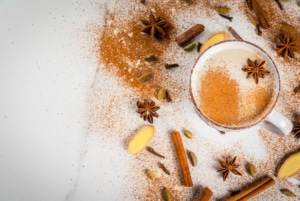
Nutmeg May Provide Natural Pain Relief and Boost Skin Health
Nutmeg oil is used in naturopathy to relieve migraines, headaches, and muscle pain. The scent is said to be calming and stress-reducing, making it a wonderfully fragrant addition to your chai tea blend.
Essential nutrients and vitamins present in nutmeg also mean it’s great for promoting glowing, healthy skin.
Star Anise Can Boost Your Immune System
Star anise may contribute to a more robust, well-functioning immune system. It contains anethole, shikimic acid, and linalool, all of which contain antibacterial properties. Interestingly, star anise may even be helpful in cases of antibiotic resistance.
Saffron May Boost Your Mood

Saffron May Boost Your Mood
Saffron has been studied for mild to moderate symptoms of depression. It’s said to be much more effective than placebos, making it a great natural alternative to certain medications.
If you suffer from serious depressive symptoms, you’ll obviously want to speak to your doctors, but for mild seasonal depression, saffron can make a great additive to your chai masala blend.
Potential Risks of Chai Tea
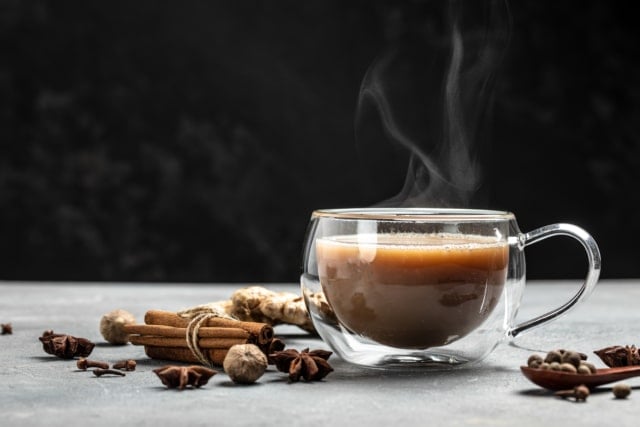
Potential Risks of Chai Tea
Chai tea is perfectly healthy and good for most people to enjoy. Any adverse effects are generally related to overconsumption, rather than having chai tea at all. Below are some of the most common side effects — avoid them easily by keeping your chai tea drinking to one to two cups per day.
Too Much Caffeine May Cause Adverse Reactions
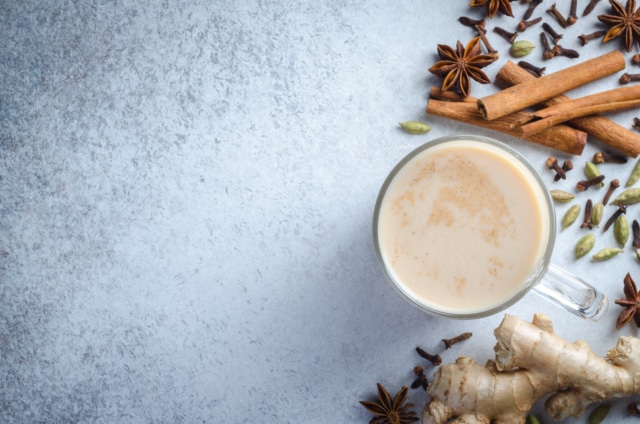
Too Much Caffeine May Cause Adverse Reactions
You shouldn’t consume more than 400 mg of caffeine per day ordinarily, and no more than 200 mg per day if pregnant. Too much caffeine may cause nervousness, nausea, an increased heart rate, insomnia, anxiety, headaches, chest pain, and more.
Tannins May Cause Digestive Issues
Too much tannic acid, which is present in tea, can inhibit digestion and reduce how well salts, food, and iron are digested. With that said, you’d need to have at least 10 cups of tea per day for it to become too much in terms of tannins as well as caffeine content.
Too Much of Some Spices May Cause Digestive Problems

Too Much of Some Spices May Cause Digestive Problems
Ingredients such as nutmeg, ginger, and cardamom may cause stomach pain, diarrhea, and/or nausea in large amounts. If you’re concerned, stick to normal culinary amounts in your tea, and don’t have too much per day.
Is Chai Tea in Pregnancy Good For You?

Is Chai Tea in Pregnancy Good For You?
Chai tea is generally safe in pregnancy, provided you watch your caffeine content. You’ll also wish to consider whether or not to buy an anise and fennel-free blend.
Star anise and fennel are both said to be safe when consumed in small amounts, though women in higher-risk pregnancy should probably avoid them.
These two herbs may increase your chances of going into labor prematurely, so you might wish to err on the side of caution, or speak to your doctor before enjoying a chai tea made with them.
As far as caffeine is concerned, you’re advised to consume a maximum of 200 milligrams of caffeine per day if you’re pregnant or breastfeeding.
The average cup of chai tea made with black tea leaves will have around 60 milligrams of caffeine. Therefore, one to two cups per day could readily be enjoyed while keeping you well under the limit.
Simple Guide for Making the Perfect Chai Tea

Simple Guide for Making the Perfect Chai Tea
There are many varieties of chai tea available to buy and make.
Our favorite recipe includes fragrant cardamom, warming black pepper, and other delicious seasonal spices. It’s perfect for Fall and into Winter, and you’ll be sure to enjoy it alongside a tasty plate of homemade cookies.
Ingredients:
- hot water
- full fat milk
- 2 ½ tsp black tea leaves
- ½ tsp of ginger
- 1 tsp of green cardamom
- ½ tsp of cloves
- 2 ½ g of cinnamon
- ¼ tsp of fennel seeds
- ¼ tsp of black pepper (ideally freshly ground)
- ½ tsp of nutmeg
And here’s how you do it:
- Add the spices to a mortar and pestle and crush them until you have a relatively fine powder.
- Add hot water (about 1 ½ cups) to a pot along with the tea leaves and spices, including the ginger if using fresh.
- Boil gently for three minutes until your tea is slowly darkening. Add the milk (about 1 cup|) and any sugar. Simmer for 3-4 minutes until slightly reduced.
- Divide into two cups. If you like, use a frother to make your chai foamy. Enjoy.
Tips for Drinking and Serving Chai Tea

Tips for Drinking and Serving Chai Tea
Chai is a versatile tea given the many different spices and ingredients you can add to it. You can truly make it your own by selecting different spices and spice grades for your own individual blend. Below are some of our top tips for making the perfect chai tea at home.
Add Honey for Some Sweetness

Add Honey for Some Sweetness
Did you know that honey has several health benefits you can enjoy alongside the goodness of your chai?
High-quality honey is antioxidant, antibacterial, anti-inflammatory, and can have helpful effects on your heart, your lungs, your digestive system, and your nerves.
And of course it tastes delicious and makes your chai extra sweet.
Experiment with the Spices You Use

Experiment with the Spices You Use
As mentioned above, you can make your chai tea blend totally unique.
Depending on your needs, you could choose to make a blend that contains no star anise or fennel, if you’re pregnant, add saffron to boost your mood, or extra nutmeg for youthful, glowing skin.
You might also just wish to experiment with whichever spices taste best to you.
Try Some Starbucks Chai Tea

Try Some Starbucks Chai Tea
Starbucks sell a huge variety of coffee, but did you know that they also have many different kinds of chai-based beverages?
You can enjoy a regular chai, pumpkin spice chai latte, chocolate cinnamon chai latte, iced chai tea latte with vanilla cold foam, chai cookie latte, and more. You can even get creative and enjoy some chai-based ‘secret menu’ drinks.
Hacks and Tips with Chai Tea

Hacks and Tips with Chai Tea
If the above tips aren’t enough for you, we’ve got some top hacks to supercharge your chai tea at home. Don’t believe us? Have a look at these two great hacks for making the best chai tea – and accompaniments – in your own house.
Make Your Own Chai Tea Concentrate

Make Your Own Chai Tea Concentrate
Chai tea concentrate is so clever, especially if you love to enjoy your chai iced. Just add a little bit to hot or cold milk, and you’ll have a fresh chai latte in no time.
You’ll want to follow your favorite chai recipe but reduce them alongside plenty of sugar to create a syrup.
Serve Your Chai Alongside Tasty Cookies
Cookies are a great side for your favorite chai tea. Simple bakes such as ginger snaps, butter cookies, or shortbread are a wonderful sweet treat to enjoy with your chai.
The sweet and spicy pairing is particularly effective, and a great treat for any guests, too.
- McFlurry Flavors. Best Flavors & Alternatives.
- Oreo Cookie Flavors. Best and Weirdest Flavors.
- Starbucks Refresher. Tips and Best Drinks.
- Jelly Belly Flavors. Best and Grossest.
- Boba Flavors. Best Flavors and Types.
- Pop Tart Flavors. Tasty Alternatives and Best Flavors.
- Cinnamon Tea. Health Benefits and Tips.
